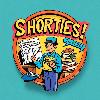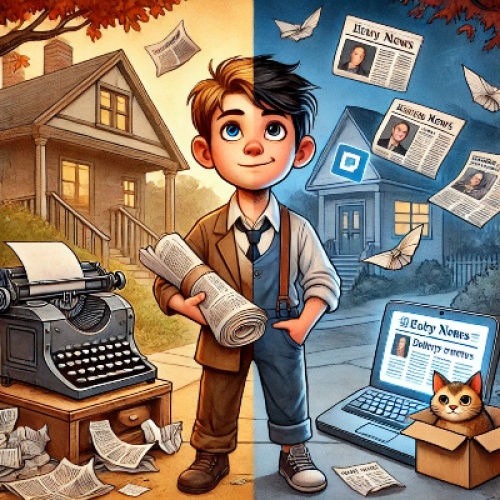Then one morning, everything changed. Max arrived at the Oakwood Gazette office, only to find the doors shut and a sign that read:
THE OAKWOOD GAZETTE IS NOW ONLINE! THANK YOU FOR YOUR PATRONAGE!
Max stared at the sign, heart sinking. Online? How would anyone even read that? Who wanted to click links on a screen when they could feel the crinkly paper, smell the ink, and dodge the occasional smear of printer oil? The horror sank in as he realized: his job was officially obsolete.
Later that day, he bumped into Mr. Fletcher, the Gazette's editor-in-chief, a man whose very essence seemed to be made of newsprint.
"Max, my boy, I'm sorry, but times are changing," said Mr. Fletcher, shrugging. "People want their news online now. Quick, easy, no need for delivery."
"But? but what about the newspaper?" Max pleaded, desperate. "What about people who like their news thrown at their doorstep?"
"Max," Mr. Fletcher sighed, "the world is moving on. Maybe it's time you found a new way to make an impact." With a sympathetic pat on the back, he wandered off, whistling.
But Max wasn't ready to give up. He wasn't about to let Oakwood lose the joy of physical newspapers without a fight.
Max spent the next week in his bedroom, planning Operation Inkstorm. If the Gazette wouldn't print papers, he would! Armed with an old inkjet printer and a wild determination, he started his own newspaper, The Oakwood Observe. Each "edition" featured local news, a homemade crossword puzzle, and even a gossip column he called The Scandal Sheet (most of it harmless nonsense he made up).
At first, it went brilliantly. People loved having something real to hold in their hands again, and Max's "headlines" quickly became the talk of the town.
"Did you hear that?" Mrs. Maple whispered to Mrs. Chow at the bakery. "Apparently the mayor secretly collects antique spoons!"
Max began producing daily editions and distributing them to his old customers. In no time, people were hooked on The Observer. It wasn't exactly factual, but it was hilarious.
But then came the first snag: one morning, Mrs. Trout, a woman known for her infamous letter-writing campaigns, appeared on Max's doorstep, waving her latest copy of The Observer.
"Max," she hissed, waving the paper, "this article says that my cat, Mr. Fluffington, terrorizes the neighborhood! That is slander!"
"Uh.. was it wrong?" Max asked, gulping.
"Well, no, he does hiss at the mailman," she admitted, "but that's hardly the point!"
After calming Mrs. Trout with a promise to only cover "constructive pet news," Max cycled on to his next delivery, relieved. He didn't realize things were about to get even trickier.
Soon after, Max's poor inkjet printer, clearly not built for mass production, started giving out. The ink smeared, the paper jammed, and the machine emitted an eerie grinding sound every time he tried to print a headline. He'd spend hours coaxing it back to life, but the machine had limits, and Max was pushing it to the brink.
And then came The Great Paper Shortage of Oakwood. One morning, he hit up every store in town, only to find that Oakwood was somehow entirely out of printer paper. Panic set in. This couldn't be the end! Desperate, he tried using the backs of flyers, leftover grocery receipts, even the inside of cereal boxes.
With dwindling supplies, Max had to scale down the Observer. His "newspaper" became a few bullet points on the backs of grocery store receipts. People were still reading it, but the experience was.. lacking.
One fateful afternoon, Max sat slumped in his garage, surrounded by the ruins of his operation: a worn-out printer, ink-stained paper scraps, and the ever-growing complaints from Mrs. Trout about her cat's latest "reputation slanders." His trusty bike leaned against the wall, a reminder of his past glory.
Maybe Mr. Fletcher was right. Maybe The Oakwood Gazette was gone for a reason. As much as he hated to admit it, people were more interested in getting their news online, where it was fast, customizable, and didn't require Max's dwindling stash of printer paper. As much as Max loved the smell of printed news, maybe.. maybe it was time to move on.
He stood up, dusting off his hands, and gazed at his old, ink-stained Observer pages scattered around him. And then, inspiration struck.
If he couldn't print newspapers, maybe he could try something different. Maybe Oakwood was ready for a new kind of paperboy.
Over the next few days, Max watched video tutorials, read online forums, and taught himself to record and edit videos. His old newspaper route became his filming route, where he'd go door-to-door, capturing footage and interviewing Oakwood residents. With an ancient camcorder and boundless enthusiasm, he launched his new project: The Oakwood News Network - his own online news show, complete with town updates, humorous "exposes" on Oakwood's quirks, and the occasional offbeat "report" on Mr. Fluffington's behavior.
Max was now an online reporter, and surprisingly, the people of Oakwood loved it. They'd tune in every morning to watch his latest episode, laughing at his antics and getting their news in real time. Mrs. Trout's cat, with its weekly "grumpy cat" segment, became a local celebrity, and Max even scored an exclusive interview with the mayor about his supposed spoon collection.
Max found himself busier than ever. He had a new following, a way to stay connected to his old customers, and all without the hassle of printer jams or Mrs. Trout's wrath. And best of all, he could sleep in a bit - no more 5 a.m. paper routes.
Max's Oakwood News Network soon became the talk of the town. Local businesses sponsored his segments, people sent in their own funny stories, and Max's fame grew beyond his neighborhood. The Gazette might have gone digital, but Max had embraced it, too, in his own quirky way.
One day, he even got an email from Mr. Fletcher, the Gazette editor, saying, "Max, I knew you'd find a way to keep Oakwood entertained. Keep it up - you're Oakwood's first online star."
Max read the email, grinned, and typed out his response:
"Thanks, Mr. Fletcher! It turns out I'm the news now."





